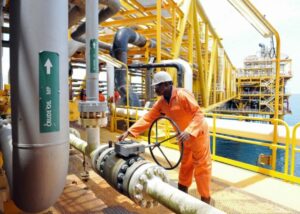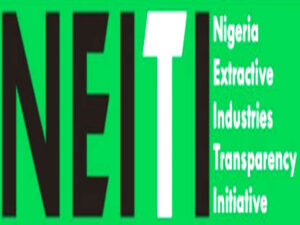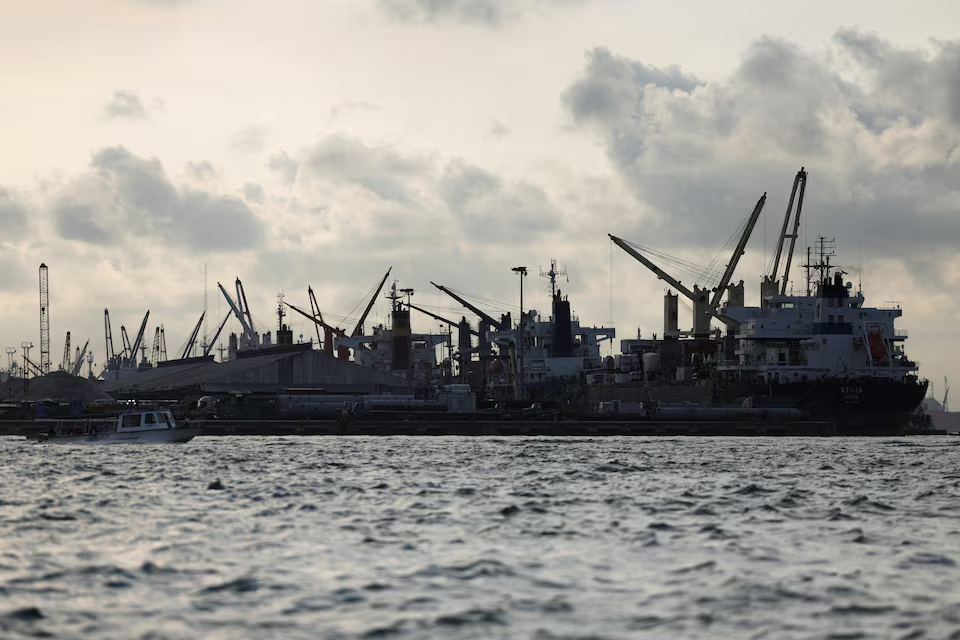The NNPC Limited, Sahara Group, Eroton E&P, and Bilton Energy Ltd have unveiled Nigeria’s first wholly owned 2.2-million-barrel capacity Floating Storage and Offloading vessel, designed to drive sustained oil and gas production.
In a statement on Wednesday, the firms said the vessel is Nigeria’s first crude oil terminal to be commissioned in 50 years.
“Christened Cawthorne, the Floating Storage and Offloading Terminal is a world-class facility designed to enhance crude evacuation from Nigeria’s OML 18 and nearby assets. OML 18 partners include Nigerian National Petroleum Company Ltd, Eroton E&P, OML Eighteen Energy Resource Ltd (a Sahara Group Company) and Bilton Ltd,” the statement said.
The NNPC Executive Vice President, Udobong Ntia, who represented the Group Chief Executive Officer, Bayo Ojulari, said the vessel “is another bold achievement from the partnership between NNPC and its JV Partners that will guarantee seamless operations and bolster the strategic targets set by President Bola Tinubu towards ensuring optimised upstream production in Nigeria.”
Strategically stationed offshore Bonny, the double-hull FSO vessel with a storage capacity of 2.2 million barrels represents a bold step forward in strengthening Nigeria’s crude export infrastructure and operational resilience, according to Sahara Group.
It was added that the facility will receive, store, and offload crude oil to export tankers, providing a dependable solution to the logistical and infrastructural constraints that have long limited Nigeria’s crude evacuation capacity.
NNPC Chief Upstream Investment Officer, Seyi Omotola, said the vessel represents a renewed hope for Nigeria’s upstream sector, adding that it also reaffirms the growing capacity of the nation to make its energy sector globally competitive.
The Head of Commercial and Planning at Asharami Energy, a Sahara Group upstream company, Tosin Etomi, stated, “The Cawthorne FSO stands as a symbol of innovation meeting necessity. It is not just a vessel; it’s an assurance of continuity, reliability, and value creation for our partners, our nation, and our people. This collaboration with the NNPC, NUPRC and other stakeholders embodies the drive to turn complex energy challenges into sustainable solutions that power progress across Africa.”
Etomi said the ultramodern vessel is fitted with digital capabilities that make it a vessel “built for the future, driving operational flexibility, reducing carbon exposure from barge movements, and enhancing overall evacuation safety. It’s an investment in the resilience of the upstream sector and our environment.”
Etomi added, “The commissioning of FSO Cawthorne reaffirms Sahara Group’s and indeed OML 18 partners’ commitment to powering progress responsibly through partnerships, innovation, and infrastructure that strengthen Africa’s energy independence.”
The statement added that the FSO Cawthorne project was conceived to address persistent challenges in Nigeria’s evacuation system, including limited barging capacity, delays in ship-to-ship transfers, and reduced vessel accessibility due to siltation at various berthing slots, which is much needed to support the assets’ 2025 exit volume of 50,000 bopd.
“Through this innovation, OML18 partners have created a more efficient, safer, and sustainable alternative that will reduce pipeline dependency and the risks associated with oil theft and vandalism. The conversion of the Cawthorne vessel from a very large crude carrier into a fully integrated FSO unit was a feat of engineering excellence. It included extensive modifications, state-of-the-art mooring systems, and cutting-edge import and export infrastructure, all designed in line with international maritime, safety, and environmental standards such as IMO and MARPOL.
Fitted with a Marine Control System, the first and only FSO with such in the region, it combines this technology with artificial intelligence to maximise fully automated import/export systems, PAGA, and security, to list a few of the features.
“The vessel can accommodate up to 50 personnel on board, offering a safe, secure, and comfortable environment for crew members and operations staff. Beyond its immediate operational benefits, the FSO serves as a scalable platform capable of accommodating future production increases and tie-ins from surrounding oil fields, further cementing its role as a strategic national asset,” the statement concluded.





